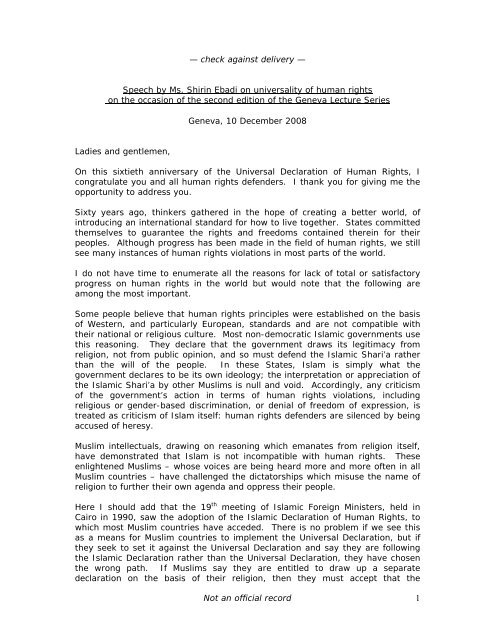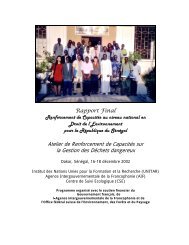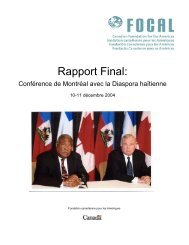Text of Shirin Ebadi's speech - UNITAR
Text of Shirin Ebadi's speech - UNITAR
Text of Shirin Ebadi's speech - UNITAR
You also want an ePaper? Increase the reach of your titles
YUMPU automatically turns print PDFs into web optimized ePapers that Google loves.
— check against delivery —<br />
Speech by Ms. <strong>Shirin</strong> Ebadi on universality <strong>of</strong> human rights<br />
on the occasion <strong>of</strong> the second edition <strong>of</strong> the Geneva Lecture Series<br />
Ladies and gentlemen,<br />
Geneva, 10 December 2008<br />
On this sixtieth anniversary <strong>of</strong> the Universal Declaration <strong>of</strong> Human Rights, I<br />
congratulate you and all human rights defenders. I thank you for giving me the<br />
opportunity to address you.<br />
Sixty years ago, thinkers gathered in the hope <strong>of</strong> creating a better world, <strong>of</strong><br />
introducing an international standard for how to live together. States committed<br />
themselves to guarantee the rights and freedoms contained therein for their<br />
peoples. Although progress has been made in the field <strong>of</strong> human rights, we still<br />
see many instances <strong>of</strong> human rights violations in most parts <strong>of</strong> the world.<br />
I do not have time to enumerate all the reasons for lack <strong>of</strong> total or satisfactory<br />
progress on human rights in the world but would note that the following are<br />
among the most important.<br />
Some people believe that human rights principles were established on the basis<br />
<strong>of</strong> Western, and particularly European, standards and are not compatible with<br />
their national or religious culture. Most non-democratic Islamic governments use<br />
this reasoning. They declare that the government draws its legitimacy from<br />
religion, not from public opinion, and so must defend the Islamic Shari’a rather<br />
than the will <strong>of</strong> the people. In these States, Islam is simply what the<br />
government declares to be its own ideology; the interpretation or appreciation <strong>of</strong><br />
the Islamic Shari’a by other Muslims is null and void. Accordingly, any criticism<br />
<strong>of</strong> the government’s action in terms <strong>of</strong> human rights violations, including<br />
religious or gender-based discrimination, or denial <strong>of</strong> freedom <strong>of</strong> expression, is<br />
treated as criticism <strong>of</strong> Islam itself: human rights defenders are silenced by being<br />
accused <strong>of</strong> heresy.<br />
Muslim intellectuals, drawing on reasoning which emanates from religion itself,<br />
have demonstrated that Islam is not incompatible with human rights. These<br />
enlightened Muslims – whose voices are being heard more and more <strong>of</strong>ten in all<br />
Muslim countries – have challenged the dictatorships which misuse the name <strong>of</strong><br />
religion to further their own agenda and oppress their people.<br />
Here I should add that the 19 th meeting <strong>of</strong> Islamic Foreign Ministers, held in<br />
Cairo in 1990, saw the adoption <strong>of</strong> the Islamic Declaration <strong>of</strong> Human Rights, to<br />
which most Muslim countries have acceded. There is no problem if we see this<br />
as a means for Muslim countries to implement the Universal Declaration, but if<br />
they seek to set it against the Universal Declaration and say they are following<br />
the Islamic Declaration rather than the Universal Declaration, they have chosen<br />
the wrong path. If Muslims say they are entitled to draw up a separate<br />
declaration on the basis <strong>of</strong> their religion, then they must accept that the<br />
Not an <strong>of</strong>ficial record<br />
1
followers <strong>of</strong> other religions are similarly entitled, for example, to draft a Jewish<br />
Human Rights Declaration, a Buddhist Human Rights Declaration, and thousands<br />
more. This is not the right way to go. The world cannot be run on the basis <strong>of</strong><br />
its myriad religions. We have to take the principles that all agree on as our<br />
premise, not the principles in which only we believe.<br />
The surprising point is that it is not only non-democratic Islamic States which<br />
resort to such arguments. Governments which do not believe in God and whose<br />
intellectual basis lies in Communism are <strong>of</strong>ten not prepared to accept and apply<br />
the principles <strong>of</strong> human rights. These States assert that human rights are built<br />
on a set <strong>of</strong> values established under a capitalist regime and are not<br />
commensurate with socialist values. They therefore allow themselves to trample<br />
on people’s rights and forcefully to stifle any voice <strong>of</strong> dissidence. Obviously, their<br />
claims too are false. Socialism is not incompatible with freedom <strong>of</strong> expression.<br />
Communism is not equivalent to despotism; it is dictatorships that interpret and<br />
apply Communism in this way. In fact, both belief in God and atheism are used<br />
as excuses for the oppression <strong>of</strong> people.<br />
Another obstacle to progress in human rights over the past 60 years has been<br />
the weak performance <strong>of</strong> the United Nations, and specifically its human rights<br />
mechanism, now known as the Human Rights Council. At the time the United<br />
Nations Charter was drafted, there was excessive optimism that – if not all –<br />
most governments would be supported and elected by their peoples and would<br />
thus, representing their peoples, investigate cases <strong>of</strong> human rights violations.<br />
However, as we have seen, many governments are not really elected by their<br />
peoples and do not take the decisions sought by the public. How can one expect<br />
countries which continuously and repeatedly violate human rights to condemn<br />
another country for precisely this reason? In this way, the scales <strong>of</strong> human<br />
rights have lost their balance. The cooperation <strong>of</strong> NGOs is essential if we are to<br />
overcome this problem, and by this I mean NGOs which are really created and<br />
run by the people, not by governments. When considering complaints or the<br />
case <strong>of</strong> a particular country, NGOs should be able to participate in meetings,<br />
make recommendations and, where appropriate, also join in voting. It is time<br />
for us to put our trust in the people and for the United Nations to bring in the<br />
real representatives <strong>of</strong> the people in the form <strong>of</strong> civil society.<br />
One other reason for lack <strong>of</strong> progress on human rights is the way they are used<br />
as a tool. Some States have misused the cause <strong>of</strong> human rights and democracy<br />
to advance their own political aims. This applies to events in the Middle East,<br />
particularly since the collapse <strong>of</strong> the Soviet Union and the end <strong>of</strong> the cold war.<br />
Another point is that the United Nations and other international bodies have so<br />
far been focussed more on the promotion <strong>of</strong> civil and political rights than on<br />
economic rights. This negligence has been one <strong>of</strong> the reasons for the spread <strong>of</strong><br />
poverty throughout the world. In this connection, I propose that an<br />
“International Convention to Combat Poverty” be drawn up and presented to the<br />
United Nations General Assembly for adoption. The most important point to be<br />
addressed in this Convention would be to encourage States to reduce their<br />
military spending. Appropriate means must be devised to ensure that public<br />
funds in every country are spent on welfare rather than the purchase and<br />
stockpiling <strong>of</strong> weapons. The Convention could provide that any Contracting State<br />
must not spend more on the military than on health and education; if a State’s<br />
Not an <strong>of</strong>ficial record<br />
2
military budget were to be higher than that for health and education, it would not<br />
qualify for loans or other benefits; for example, the World Bank could not lend to<br />
it. Under the Convention, where a country is unable to pay <strong>of</strong>f its foreign debts,<br />
if it were to dissolve its army and use only the police force for law and order,<br />
most or all <strong>of</strong> its debts could be forgiven. In this way, small and poor countries<br />
would be encouraged to buy fewer arms, and another effect would be to reduce<br />
cases <strong>of</strong> internal warfare. I know that such ideas – at a time <strong>of</strong> universal<br />
turbulence, with the arms race at dangerous levels – may sound like dreams; but<br />
our challenge here today is to think in terms <strong>of</strong> dreams while acting realistically.<br />
The fight against terrorism and the preservation <strong>of</strong> national security have also<br />
been used as a pretext in recent years for systematic human rights violations.<br />
Some States have used the excuse <strong>of</strong> national security to undermine individual<br />
freedoms while augmenting their own power. We must consider how to devise a<br />
mechanism which extends individual security rather than national security.<br />
This dangerous weapon – the ability to use national security as an excuse to<br />
stifle and repress the people - must be taken away from all governments,<br />
particularly those which are not chosen by their country’s people. Let us recall<br />
once again the message in the preamble to the Universal Declaration <strong>of</strong> Human<br />
Rights: peace and security can be ensured only by the observance <strong>of</strong> human<br />
rights.<br />
I thank you for listening patiently to what I had to say.<br />
Not an <strong>of</strong>ficial record<br />
3





